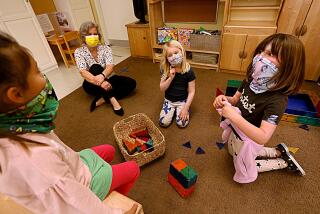GOP to Bar National Schooling Tests
WASHINGTON â House and Senate Republican leaders agreed Friday to block President Clintonâs national education tests but agreed to study an alternative way for children to learn how they are doing in reading and mathematics.
Clinton, however, said he would veto any bill that stops his testing plan and accused the Republicans of wanting the government to âwalk awayâ from public schools.
The GOP decision to block his testing plan could further escalate the battle between Clinton and Republicans over education. But its agreement to study an alternative could offer both a way out of the impasse.
The measure is included in an $80-billion spending bill for the Education, Labor and Health and Human Services departments.
âIf thereâs any attempt in Congress to kill this effort at national standards and voluntary testing, I will have to veto it,â Clinton told teachers who were visiting the White House.
Republicans, he said, âare ready to raise the white flag and abandon public schools.â
Sparring between the White House and Congress over education has intensified. House Republicans have passed bills that would use direct federal spending or tax breaks to pay for private and public schools. And they have rejected Clintonâs call for an army of volunteer reading tutors.
Under the testing agreement, the current spending bill would force the Education Department to cancel its $13-million contract to develop the tests, which are scheduled to start in 1999.
Instead, the National Academy of Sciences, National Governorsâ Assn. and National Conference of State Legislatures would study whether existing commercial tests that are widely given could be adapted to give individual students an idea of whether they are meeting basic levels of achievement in reading and math.
Those tests, such as the Iowa Tests of Basic Skills, now rate students against a moving average, not a fixed standard that the administration wants.
The administration wanted new tests based on the National Assessment of Educational Progress, which is given to a sampling of students to track their progress.
The study would have to be finished by March 31, 1998.
A spokeswoman for House Speaker Newt Gingrich (R-Ga.) said the agreement was not final because he still wanted to discuss it with other House members.
The agreement was necessary because the House had passed a spending bill that would block the national tests. The Senate-passed version allowed the tests to go forward, but under the supervision of an independent board.
The Senate aide said opponents were worried that the tests would be used to create a national curriculum. The administration has denied that.
More to Read
Sign up for Essential California
The most important California stories and recommendations in your inbox every morning.
You may occasionally receive promotional content from the Los Angeles Times.










